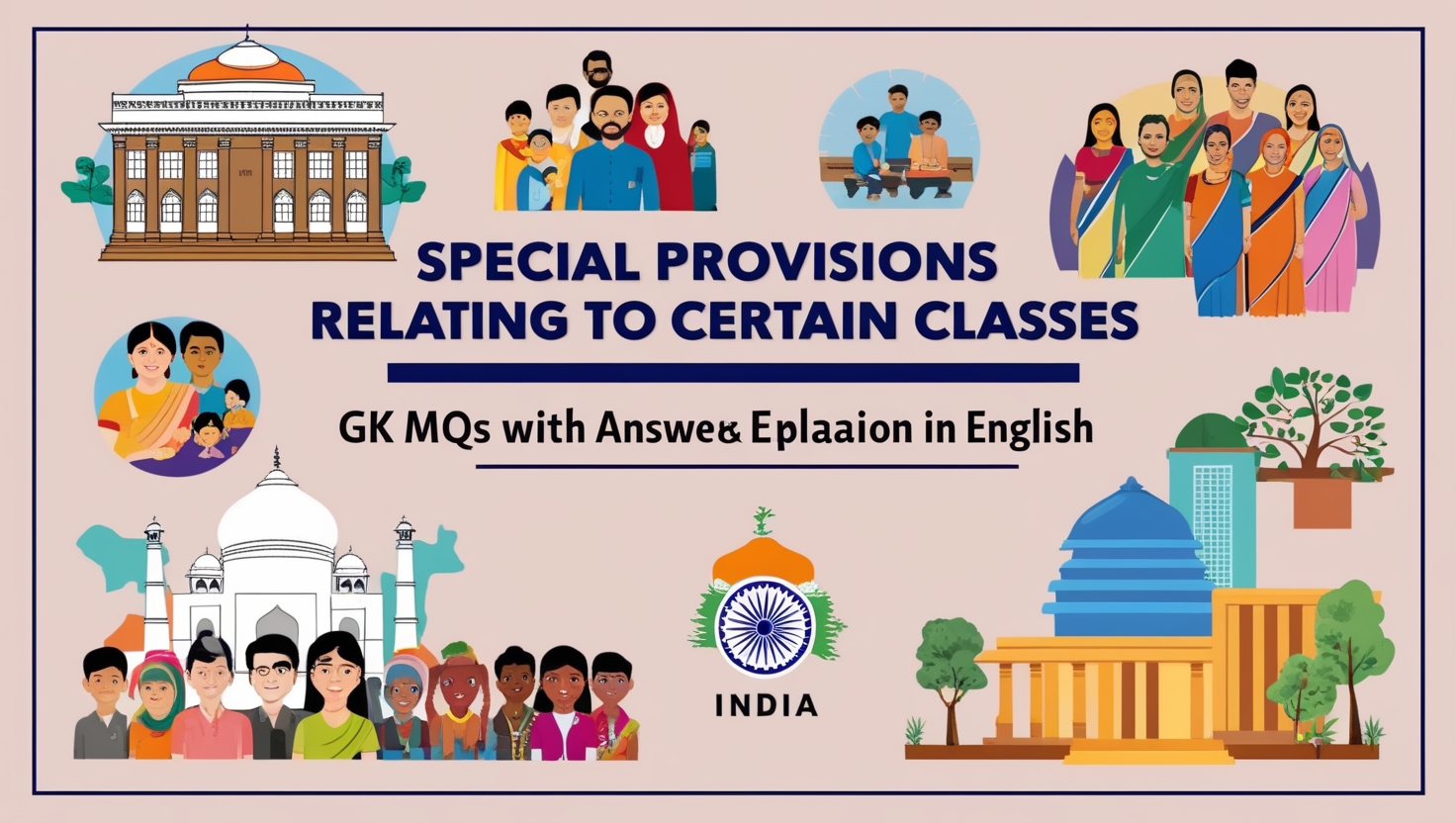
The article titled Special Provisions Relating to Certain Classes GK MCQs With Answer & Explanation in English provides a comprehensive set of multiple-choice questions designed to help you understand the constitutional provisions that offer special protection to certain classes in India.
These questions are accompanied by detailed answers and explanations to enhance your knowledge and prepare you effectively for competitive exams. Whether you’re studying for a civil service exam or improving your general knowledge, this article is a valuable resource.
1. Which of the following articles of the constitution mention special provisions for the scheduled castes (SCs), the scheduled tribes (STs), the backward classes (BCs), and the Anglo-Indians?
- Articles 330 to 342A
- Articles 344 to 352A
- Articles 350 to 352A
- Articles 360 to 362A
Show Answer
Answer: Articles 330 to 342A
Articles 330 to 342A of the Constitution of India pertain to special provisions for various communities and sections of society, including the scheduled castes (SCs), scheduled tribes (STs), other backward classes (OBCs), and the Anglo-Indians.
2. Which of the following has the power to specify as to what castes or tribes in each state and union territory are to be treated as the SCs and STs?
- Parliament
- President
- National Commission for SCs
- National Commission for STs
Show Answer
Answer: President
The President of India holds the authority to specify which castes or tribes in each state and union territory should be considered as SCs and STs. The Constitution itself doesn’t provide this specification. This delegation of power allows the President to adapt the lists according to changing circumstances.
3. Which of the following can include or exclude any caste or tribe from Presidential notification?
- Supreme Court
- President
- Parliament
- National Commission for Minorities
Show Answer
Answer: Parliament
The lists of Scheduled Castes and Scheduled Tribes may differ from state to state and union territory to union territory in India. The inclusion or exclusion of any caste or tribe from the Presidential notification can only be performed by the Parliament of India, and subsequent Presidential notifications cannot amend this list unilaterally.
4. The 102nd Amendment Act of 2018 empowered which of the following to specify the socially and educationally backward classes in relation to a state or union territory?
- Parliament
- President
- Governor
- Prime Minister
Show Answer
Answer: President
The 102nd Amendment Act of 2018 amended the Constitution to empower the President of India to specify the socially and educationally backward classes in relation to a particular state or union territory. This amendment aimed to strengthen the process of identifying and providing for these classes.
5. Which of the following has been defined in the Constitution of India?
- Scheduled Caste
- Scheduled Tribe
- Other Backward Classes
- Anglo-Indian
Show Answer
Answer: Anglo-Indian
While the Constitution doesn’t define which specific castes or tribes are included in SCs, STs, and OBCs, it does provide a definition of the Anglo-Indian community. This clarification helps in determining the rights and privileges of the Anglo-Indian community.
6. On which of the following bases are seats reserved for the SCs and STs in the Lok Sabha and the state legislative assemblies?
- Area
- Population
- Gender
- Locality
Show Answer
Answer: Population
The Indian Constitution reserves seats for SCs and STs in the Lok Sabha (Lower House of Parliament) and state legislative assemblies based on their population ratios. This reservation system aims to provide representation to these marginalized communities in the political arena.
7. Which amendment to the Constitution of India provides for making any provision in favour of the SCs and STs for relaxation in qualifying marks in any examination or lowering the standards of evaluation?
- 82nd
- 83rd
- 84th
- 85th
Show Answer
Answer: 82nd
The 82nd Amendment Act of 2000 introduced provisions allowing for the relaxation of qualifying marks in examinations or lowering the standards of evaluation to provide reservation in promotions to public services at the national and state levels. These provisions are designed to address the issue of unequal access to opportunities and underrepresentation.
8. In which year was a committee constituted under U.N. Dhebar to report on the administration of the scheduled areas and the welfare of the STs in the states?
- 1955
- 1960
- 1965
- 1970
Show Answer
Answer: 1960
In 1960, a committee was formed under the leadership of U.N. Dhebar by the President of India to examine the administration of scheduled areas and the welfare of STs in states. This committee played a significant role in assessing the conditions of these communities.
9. Which of the following is empowered to appoint a commission to investigate the conditions of socially and educationally backward classes and to recommend steps to improve their condition?
- President
- Rajya Sabha
- Lok Sabha
- Prime Minister
Show Answer
Answer: President
The President of India has the authority to appoint commissions to investigate the conditions of socially and educationally backward classes and recommend measures to uplift their status. Such commissions are crucial for devising policies and strategies to address the issues faced by these communities.
10. In which year was the first backward classes commission appointed?
- 1951
- 1952
- 1953
- 1954
Show Answer
Answer: 1953
The first Backward Classes Commission was established by the President of India in 1953, with Kaka Kalelkar as its chairman. This commission submitted its report in 1955, laying the foundation for addressing the concerns of backward classes.







